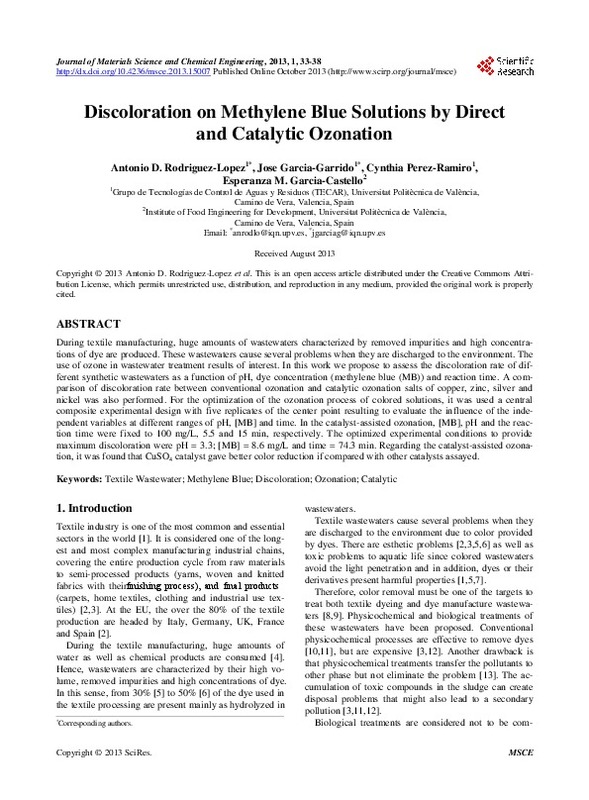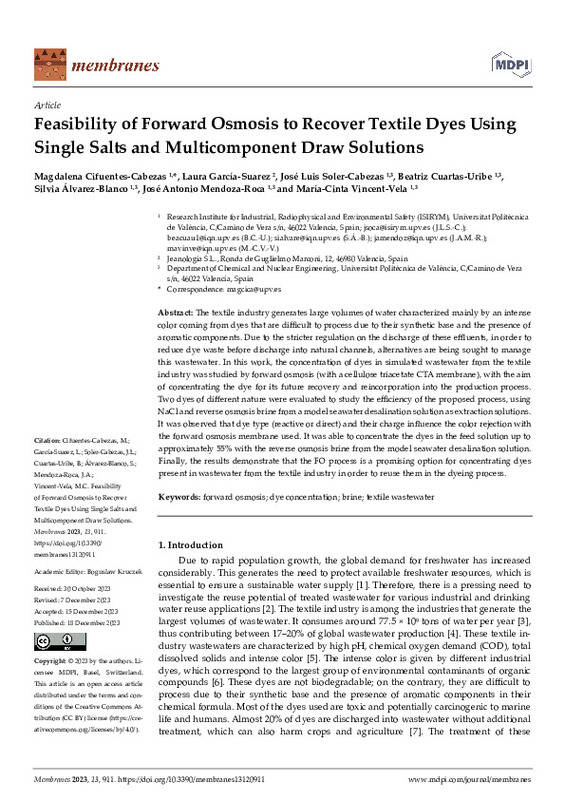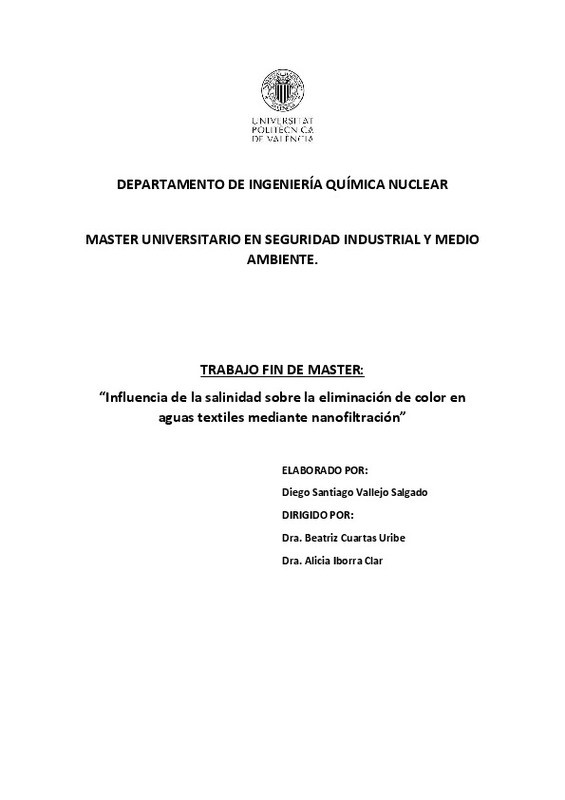

Listar por palabra clave "Textile wastewater"
RiuNet: Repositorio Institucional de la Universidad Politécnica de Valencia
- RiuNet repositorio UPV
- :
- Listar por palabra clave
JavaScript is disabled for your browser. Some features of this site may not work without it.
Buscar en RiuNet
Listar
Mi cuenta
Ayuda RiuNet
Admin. UPV
Listar por palabra clave "Textile wastewater"
Mostrando ítems 1-9 de 9
-
Barredo Damas, Sergio; Alcaina Miranda, María Isabel; Iborra Clar, María Isabel; Mendoza Roca, José Antonio (Elsevier, 2012-06-01)Membrane technologies have emerged as one of the best suitable alternatives for the management of highly polluted effluents generated in the textile industry processes. These technologies are capable either of being used ...
-
Rodríguez López, Antonio Diego; García Garrido, José; Pérez Ramiro, Cynthia; Garcia-Castello, Esperanza M. (Scientific Research Publishing, 2013-10)During textile manufacturing, huge amounts of wastewaters characterized by removed impurities and high concentrations of dye are produced. These wastewaters cause several problems when they are discharged to the environment. ...
-
García Suárez, Laura (Universitat Politècnica de València, 2019-09-26)[ES] En los últimos años, la ósmosis directa se ha situado en el centro de todas las investigaciones que atañen a los procesos de separación por membranas, debido principalmente a su bajo coste económico y su alta ...
-
Barredo Damas, Sergio; Alcaina Miranda, María Isabel; Iborra Clar, María Isabel; Mendoza Roca, José Antonio; Gemma, Matteo (Taylor & Francis, 2011-03)Textile industries are considered as one of the most polluting among all the industrial sectors. Therefore, the disposal of textile effluents without the appropriate treatment entails high environmental risks. Moreover, ...
-
Cifuentes-Cabezas, Magdalena; García-Suarez, Laura; Soler Cabezas, José Luis; Cuartas Uribe, Beatriz Elena; Alvarez Blanco, Silvia; Mendoza Roca, José Antonio; Vincent Vela, Maria Cinta (MDPI AG, 2023-12)[EN] The textile industry generates large volumes of water characterized mainly by an intense color coming from dyes that are difficult to process due to their synthetic base and the presence of aromatic components. Due ...
-
Barredo Damas, Sergio; Alcaina Miranda, María Isabel; GEMMA, MATTEO; Iborra Clar, María Isabel; Mendoza Roca, José Antonio (IWA Publishing, 2011)[EN] This work studies the performance of three commercial ceramic ultrafiltration membranes (ZrO 2-TiO 2) treating raw effluent from a textile industry. The effect of crossflow velocity at 3, 4 and 5 m s -1 as well as ...
-
Influencia de la salinidad sobre la eliminación de color en aguas textiles mediante nanofiltración Vallejo Salgado, Diego Santiago (Universitat Politècnica de València, 2018-10-23)La industria textil es uno de los sectores más antiguos y complejos dentro de las industrias manufactureras, este sector consta de numerosos subsectores que abarcan todo el ciclo de producción, desde las materias primas ...
-
Sequencing batch reactor technology coupled with nanofiltration for textile wastewater reclamation Zuriaga-Agustí, E.; Iborra-Clar, María Isabel; Mendoza Roca, José Antonio; Tancredi, M; Alcaina-Miranda, María Isabel; Iborra Clar, Alicia (Elsevier, 2010)[EN] Textile wastewaters are characterized by high organic matter concentration and colour presence. Conventional treatments do not remove completely the colour since the aerobic bacteria cannot degrade the azo-bond of the ...
-
Rendon-Castrillón, Leidy; Ramirez-Carmona, Margarita; Ocampo-López, Carlos; González-López, Federico; Cuartas Uribe, Beatriz Elena; Mendoza Roca, José Antonio (Elsevier Ltd., 2023-09-26)[EN] In recent decades, the extensive use of synthetic dyes in dye-based industries, particularly the textile sector, has led to environmental contamination, raising concerns about water quality and human health. This ...
Mostrando ítems 1-9 de 9

Universitat Politècnica de València. Unidad de Documentación Científica de la Biblioteca (+34) 96 387 70 85 · RiuNet@bib.upv.es







